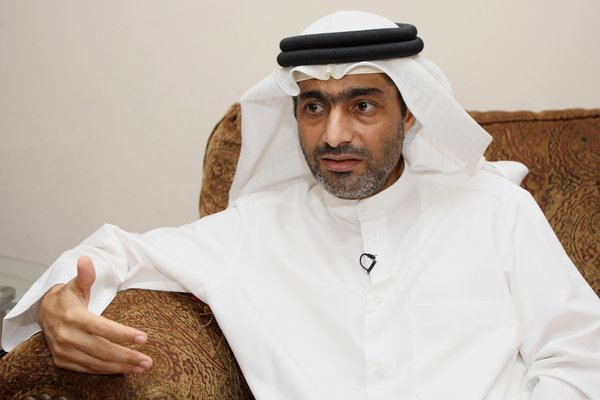
Oct 16, 2019
In an open letter, the ICJ and 139 other groups are calling the authorities of the United Arab Emirates to immediately and unconditionally release human right defender and 2015 Martin Ennals Award Laureate Ahmed Mansoor.
The full letter can be downloaded below in English and Arabic.
UAE-Free Ahmed Mansoor-Advocacy-Open letters-2019-ENG (English version, PDF)
UAE-Free Ahmed Mansoor-Advocacy-Open letters-2019-ARA (Arabic version, PDF)
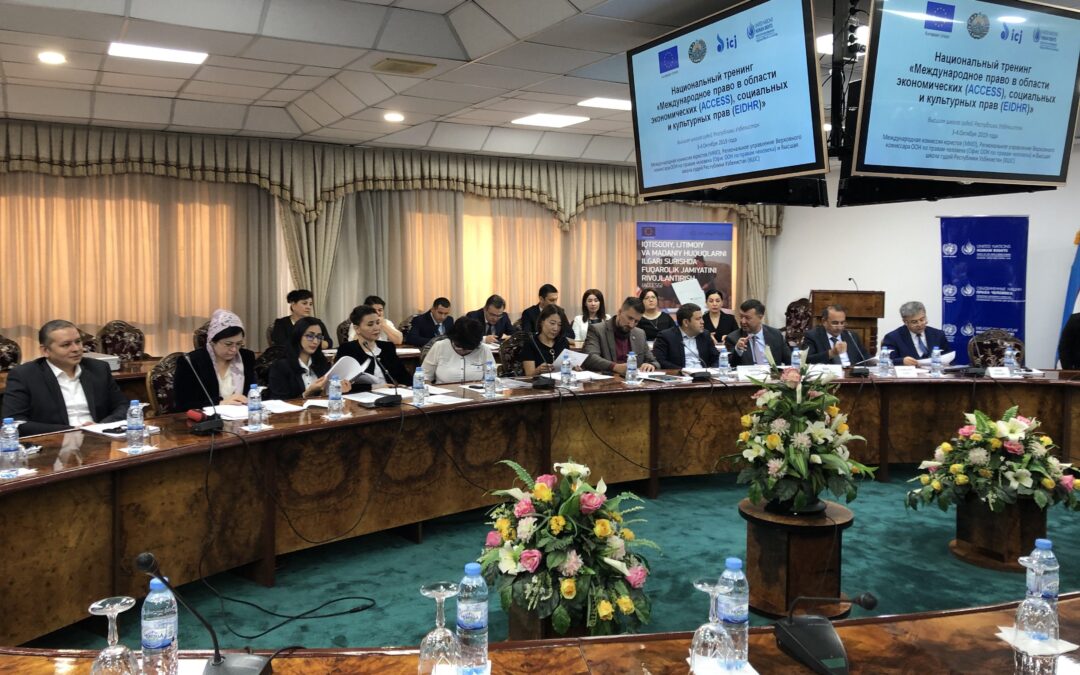
Oct 3, 2019 | News
Today, the ICJ, the Regional office of the UN High Commissioner for Human Rights (OHCHR) for Central Asia and the High School of Judges of the Republic of Uzbekistan (HSJ) are organizing a national training on “International law on economic, social and cultural (ESC) rights.”
This two-day training is one of series of similar trainings, held in 2019 and 2020, that will address international law on issues including rights to healthcare, education, housing and rights in the workplace.
The training sessions aim to build the capacity of judges, lawyers, prosecutors, legal academics and other representatives of the civil society on international standards on ESC rights, to share best practices on compliance by States with their international obligations, including through judicial practices related to ensuring access to justice for ESC rights.
The training sessions ensure diversity and networking opportunities between members of the judiciary and others legal practitioners.
Each training consists of four modules on (1) introduction to international law on ESC rights; (2) International obligations concerning access to justice and remedies for ESC rights in national courts; comparative examples of good practice; (3) Children’s ESC rights and (4) Women’s ESC rights.
Head of the EU Delegation in Uzbekistan Ambassador Eduards Stiprais pointed out, “Uzbekistan is taking serious international commitments to align its legislation with international norms and practices. Under Uzbekistan Constitution, these international commitments take precedence over the national law. They will reinforce the rights of Uzbekistan citizens and international investors. This will boost the economic and social development of the nation, but it will also put high demands to the judiciary system to ensure that its decisions fully comply with international norms and offer remedies against all breaches.”
Ryszard Komenda, OHCHR Regional Representative for Central Asia, noted that “Uzbekistan since 1995 has committed itself to ensure implementation of provisions of the International Covenant on Economic, Social and Cultural Rights (ICESCR).
To date, Uzbekistan has already submitted three national periodic reports on implementation of the Covenant. The third national report was submitted in June 2019 and will be reviewed after 2020.
The UN Committee, tasked to oversee states’ compliance with their commitments under the ICESCR, has issued a number of recommendations for Uzbekistan.
Many of them highlight the instrumental role of training on economic, social and cultural rights as a means to build capacity of state actors to respect, protect and fulfil human rights.
Only through comprehensive understanding of the content of each right and realizing that all human rights are interrelated, indivisible and interdependent, it will be possible to guarantee holistic implementation of existing international human rights obligations of Uzbekistan”.
“These trainings are an important part of capacity building which is essential in ensuring the effectiveness of the reform of the judiciary,” said Róisín Pillay, Europe and Central Asia Programme Director of the ICJ.
“It is vital to build capacity of different actors of the justice system: members of the judiciary, law enforcement agencies, lawyers and civil society, to ensure a greater impact. Together with the OHCHR and the Supreme School of Judges and the great support of the EU Delegation in Uzbekistan, we could provide the space necessary for learning about international human rights law and, in particular, its various aspects related to economic, social and cultural rights,” she added.
The Director of the Higher School of Judges briefly spoke about the activities of the Supreme School of Judges (SSJ), and also noted the recent arrival of the UN Special Rapporteur on the independence of judges and lawyers, Mr. Diego Garcia Sayan, who paid special attention to the establishment of the SSJ, along with other judiciary reforms in Uzbekistan.
“The international seminar in which we have gathered today gives us the opportunity to establish networking with other organizations and bodies through promotion of economic, social and cultural rights. The exchange of ideas and experience in the necessity of the modern world, for the mutual development of the judiciary, education and the society as such,” said Khodji-Murod Isakov, the Director of the Higher School of Judges.
The national trainings are organized in the framework of project “Advancing Civil Society in Promoting ESCR Standards (ACCESS)” funded by EU through the European Instrument for Democracy and Human Rights (EIDHR).
There will be two more similar trainings in 2020 and all trainings materials at the end will be translated into Russian and Uzbek languages for further reference and use. Moreover, the trainings materials will be publicly available in 2020 for wider outreach and promotion of international law and ESC rights standards.
Contact
Dilfuza Kurolova, ICJ Legal consultant, t: +998 90 9050099 ; e: dilfuza.kurolova(a)icj.org
Download
Uzbekistan-National Training ESCR-News-2019-ENG (full story in PDF)
International law on economic, social and cultural (ESC) rights (4 training modules in Russian – PDF).
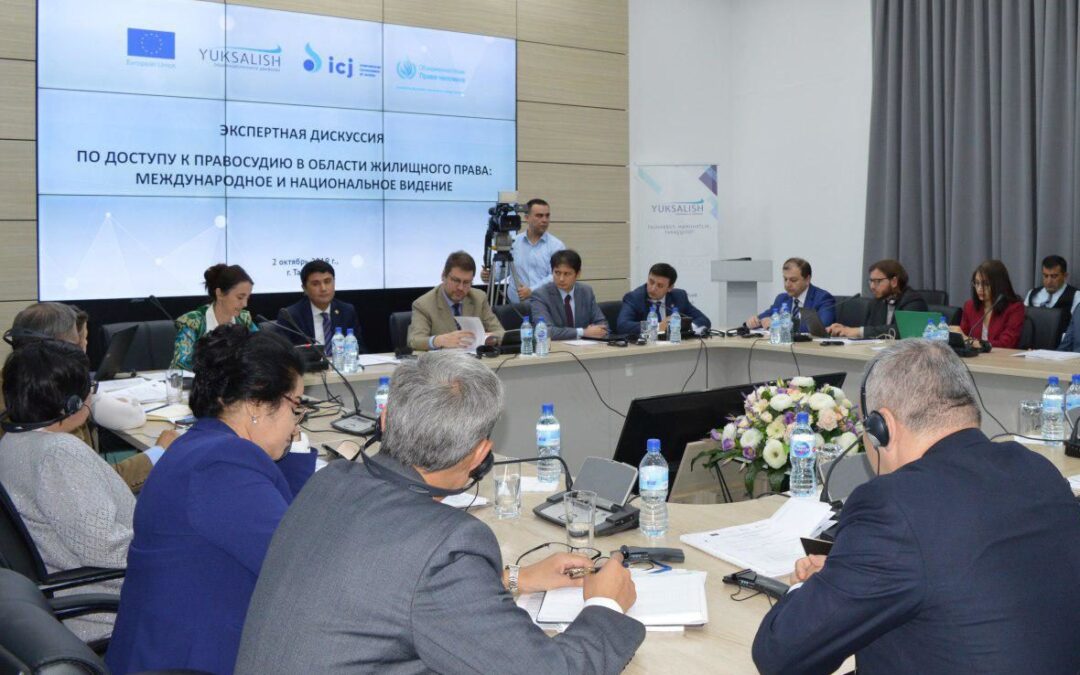
Oct 2, 2019 | News
Today, the ICJ, Regional Office of the UN High Commissioner for Human Rights (OHCHR) for Central Asia and the Nationwide Movement “Yuksalish” are holding an Expert Discussions on economic, social and cultural rights (ESC) rights and standards in Uzbekistan.
The topic of the Fourth Expert Discussions is “Access to justice for housing rights: international and national perspectives.” This discussion will be focused on the right to adequate housing.
The Expert Discussions are aimed at increasing awareness about the implementation of international law and standards on ESC rights by national courts, to facilitate access to justice in relation to ESC rights and effective use of international human rights law for ESC rights at the national level.
Each Expert Discussion is supported by presentations of international and national experts.
The first experts’ meeting was held in September 2018 on international standards in labour rights, the second meeting – held in December 2018 touched upon the principle of non-discrimination in courts and court decisions, and the third meeting – held in March 2019 – was dedicated to the rights of people with disabilities.
These three events brought together lawyers, defense lawyers, individual experts, civil society activists, NGOs, academia representatives and law students via interactive discussions, research papers, peer review articles and policy papers.
“In recent years, large-scale work has been carried out in Uzbekistan to provide housing for the rural population through the construction of affordable residential buildings according to updated standards. However, participatory decision-making is in need to guarantee housing rights. It is vital to create opportunities for various groups to speak out on the topic and establish an open dialogue. We hope that today`s platform is one of such tools for exchange of opinions,” said Akmal Burkhanov, Chairperson of the Nationwide Movement “Yuksalish”.
Head of the EU Delegation in Uzbekistan Ambassador Eduards Stiprais said: “Economic, social and cultural rights are fundamental rights for every individual. They are also fundamental for the economic development of the society. No man and no company will invest in improving its situation unless it can rely on its right to appropriate the fruits of its investment.”
Helena Fraser, UN Resident Coordinator, noted in her opening remarks that “under Sustainable Development Goal 11 by 2030 all UN member States commit to “make cities and human settlements inclusive, safe, resilient and sustainable. The nationally adopted SDG targets for Uzbekistan are to ensure access to affordable housing for all; and to increase the scale of participatory planning of human settlements”.
“These, our fourth expert discussions on economic and social rights, are devoted to the important issue of the right to adequate housing, a right that is well established in international human rights law. We aim to hold a constructive discussion, informed by international law as well as national best practices, to find ways to address an array of issues linked to housing rights in Uzbekistan. We would like to thank the EU Delegation for their support, as well as our partners – the Regional UN Human Rights Office (OHCHR) for Central Asia and the Nationwide movement “Yuksalish”,” said Róisín Pillay, Europe and Central Asia Programme Director of the ICJ.
Background
Uzbekistan ratified the International Covenant on Economic, Social and Cultural Rights (ICESCR) in 1995. In 2014, the Committee on Economic, Social and Cultural Rights recommended Uzbekistan “to take appropriate measures, including legislative and other measures, to provide all evicted persons with alternative accommodation or adequate compensation”.
The third national periodic report of Uzbekistan on implementation of provisions of the ICESCR was submitted in June 2019. The list of questions regarding the submitted report will be adopted in March 2020.
The Expert Discussions are organized in the framework of the project “Advancing Civil Society in Promoting Economic, Social and Cultural Rights’ (ESCR) Standards (ACCESS)” funded by the EU through the European Instrument for Democracy and Human Rights (EIDHR).
Contact
Dilfuza Kurolova, ICJ Legal consultant, t: +998 90 9050099 ; e: dilfuza.kurolova(a)icj.org
Download
Uzbekistan-Expert discussions ESCR-News-2019-ENG (full story in PDF)
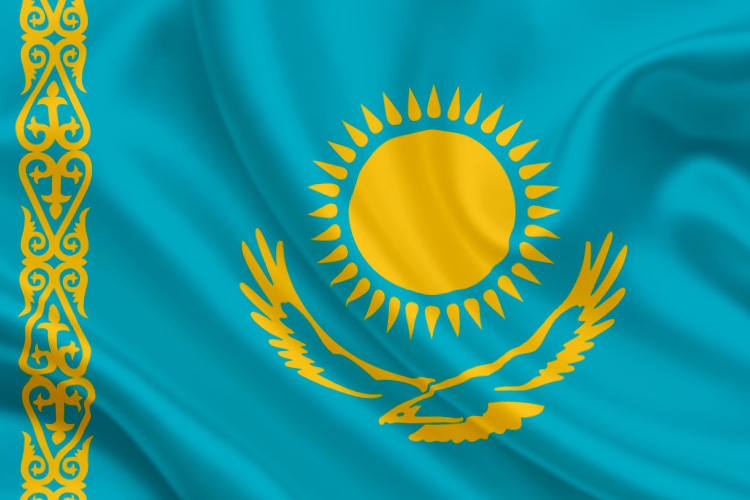
Sep 30, 2019 | Agendas, Events, Uncategorized
Today, in the framework of the EU funded project “Enhancing legal protection of migrants rights in Kazakhstan”, the Legal and Policy Resource Center (LPRC) and the ICJ began a series of three trainings linked to this issue for lawyers and civil society organizations.
Three two-day trainings on “International and national Law on the protection of migrants in legal practice” will take place from 30 September to 5 October in Nur-Sultan, Shymkent and Almaty.
The trainings will address international and national law and standards relevant to the protection of the rights of migrants, including in situations of expulsion and detention, as well as with regard to the respect, protection and fulfilment of their economic, social and cultural rights.
During the trainings, 100 attorneys and lawyers of non-governmental organizations from 10 regions of Kazakhstan will be trained.
Kazakhstan-Training-Agenda-MigrationIHRL-NurSultan-2019-engrus (download the agenda of the Nur Sultan training in Russian and English)
Kazakhstan-Training-Agenda-MigrationIHRL-Shymkent-2019-engrus (download the agenda of the Shymkent training in Russian and English)
Kazakhstan-Training-Agenda-MigrationIHRL-Almaty-2019-engrus (download the agenda of the Almaty training in Russian and English)
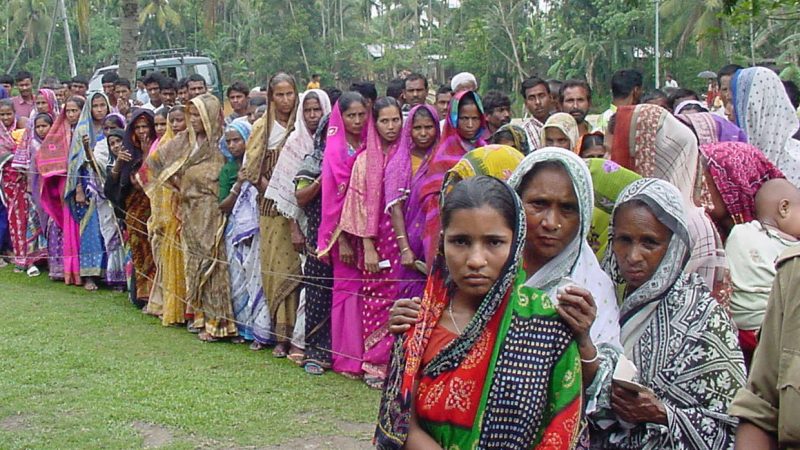
Sep 6, 2019 | News
The ICJ, along with 124 other international and domestic civil society groups from around the world have condemned the actions of Indian government in publishing an incomplete and discriminatory Assam National Register of Citizens (NRC) on 31 August, 2019.
The NRC excludes some 1.9 million people – nearly 6 percent of the population of Assam – thereby rendering them at risk of statelessness. The statement points to violations of rights to equality and non-discrimination, as the process has disproportionately affected Muslims of Bengali descent, undocumented women and children as well as other minorities.
The groups call on India to take measures to redress the situation in a non- discriminatory and non-arbitrary manner, with full regard to due process rights and a commitment to protect the right to a nationality and to avoid statelessness of all long-term residents and their children.
Arbitrary deprivation of nationality is a human rights violation, which undermines the enjoyment of the human rights of those affected and their ability to participate fully in society. International law prohibits the arbitrary deprivation of nationality and obliges States to avoid statelessness, while guaranteeing the right of every child to acquire and preserve their nationality and to be protected from statelessness.
In 2015, the Assam state government, pursuant to a Supreme Court decision, announced it would initiate a process of updating the NRC, requiring every person in Assam who recognized themselves as an Indian citizen, to submit proof of their ancestry (or birth) in the country pre-dating 1971, the year that Bangladesh was formed. The act of requiring individuals to prove their citizenship by providing documentary evidence dating back over 50 years, and excluding applicants on the basis of their inability to fulfill this evidentiary burden, has led to arbitrary deprivation of nationality, contrary to Article 15 of the Universal Declaration of Human Rights.
Further, poor birth registration rates, despite an obligation under Article 7 of the Convention of the Rights of the Child to immediately register every birth has denied numerous applicants of a critical piece of evidence to establish their citizenship. Similarly, many people who possessed the required documents, have nonetheless been penalized due to administrative errors.
Despite repeated calls to action by UN human rights authorities, India has refused to reverse the process and other States have done little to press the Indian government to reverse course.
Those excluded from the list must appeal within 120 days to Foreigners Tribunals (FT), a quasi-judicial institution mandated to determine citizenship. In essence, this implies that the government already considers those excluded from the NRC to be foreigners, and not Indian citizens.
Find the full statement, endorsed by the ICJ and 124 other international and domestic civil society groups from around the world here: https://files.institutesi.org/cso-joint-statement-on-assam-nrc.pdf
Contact:
Maitreyi Gupta (Delhi), ICJ International Legal Adviser for India, t: +91 7756028369 e: maitreyi.gupta(a)icj.org
Frederick Rawski, ICJ Asia-Pacific Director, t: +66 64 478 1121; e: frederick.rawski(a)icj.org









